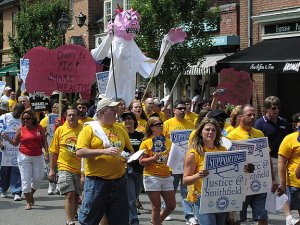Is Fighting for Justice at Smithfield Racketeering?


Is it illegal for an activist group or union to criticize a company’s business practices? Is it a “conspiracy” if advocates call for boycotts, organize rallies, or press for resolutions from elected bodies?
Smithfield Foods, the largest producer of pork products in the world, is hoping so, after a lawsuit it filed last October passed an initial court challenge. The suit aims to halt the United Food and Commercial Workers’ campaign to unionize 4,600 workers in its Tar Heel, North Carolina, slaughterhouse. The company is using a 1970 statute originally designed to battle gangsters’ extortion schemes—the Racketeer Influenced and Corrupt Organizations Act (RICO).
“This is a terrible menace to rights of free speech and protest, and constitutional rights and freedom of expression,” said Lance Compa, Cornell University labor relations professor and an expert on the meatpacking industry. “It’s a really dangerous new offensive that employers have seized on to try to snuff out legitimate protest about abusive employer conduct.”
Jobs with Justice, which is named as a defendant in the suit, is launching a campaign against corporations’ use of the RICO act, which has surfaced intermittently as one legal tactic among an arsenal to silence corporate critics. The act has been used to file suits in recent months against campaigns by the Service Employees (SEIU) at the Wackenhut security firm, and the UFCW at an Arizona-based grocery chain.
JWJ expects to work with unions, central labor councils, and city councils to pass fresh resolutions condemning the lawsuit.
“Our goal is to protect the right of not only unions to engage in these activities, but everybody fighting corporate abuses,” said Russ Davis, director of Massachusetts JWJ. “Hopefully we can deter corporations from going down this road. But if these things occur again we want to be ready.”
A VAST CONSPIRACY?
Smithfield sees a wide array of plotters conspiring against it, naming UFCW, JWJ, Research Associates of America, and Change To Win, the labor federation to which the UFCW belongs. Also named are eight individuals, including UFCW President Joe Hansen, the union’s Smithfield campaign director Gene Bruskin, and Andy Stern, SEIU president.
The defendants’ supposed crime? They employed strategies long used by unions and social movements to educate the public, garner support, and pressure corporations.
Since the UFCW’s Justice at Smithfield campaign began in June 2006, the union has asked city councils to pass resolutions and boycott Smithfield products, demonstrated at stockholder meetings, and filed health and safety complaints with OSHA. Stores in Massachusetts pulled Smithfield products from their shelves.

SUPPORT LABOR NOTES
BECOME A MONTHLY DONOR
Give $10 a month or more and get our "Fight the Boss, Build the Union" T-shirt.
All these actions the company cites in its lawsuit as evidence of “formation of the conspiracy,” “delivery of the threat,” and “publication of false, misleading, baseless, negative and/or damaging information on the Internet and in the newspapers.”
“Whatever economic consequences flow, they are not considered in the law sufficient to deprive people of free speech,” said Joan Bertin, director of the National Coalition Against Censorship, a member of the anti-RICO coalition.
The defendants’ supposed crime? They employed strategies long used by unions and social movements to educate the public, garner support, and pressure corporations.
The union said it had to turn to an aggressive campaign for consumer and community support because Smithfield repeatedly violated laws that are supposed to allow workers to organize.
The UFCW has lost two National Labor Relations Board elections at the plant, both of which were overturned after reams of unfair labor practice charges were sustained against the company. Smithfield’s violations include firing workers for talking about the union, and attempts to spy on and intimidate them.
“A TERRIBLE DISTRACTION”
“They’re trying to box us into a slow, NLRB process, because it doesn’t punish them for violations—all (workers) get is back-pay and reinstatement,” said Renee Bowser, UFCW’s assistant general counsel.
Court-watchers doubt the suit will survive. A similar RICO suit brought by Detroit’s newspapers last decade against striking newspaper workers ultimately failed.
“This form of coalition building, holding demonstrations—all of these are classic forms of freedom of association, freedom of expression, and freedom of assembly,” Compa said. “Ultimately the case won’t hold up. In the meantime it’s a terrible distraction.”
For more information, see JWJ’s Free Speech at Risk.






